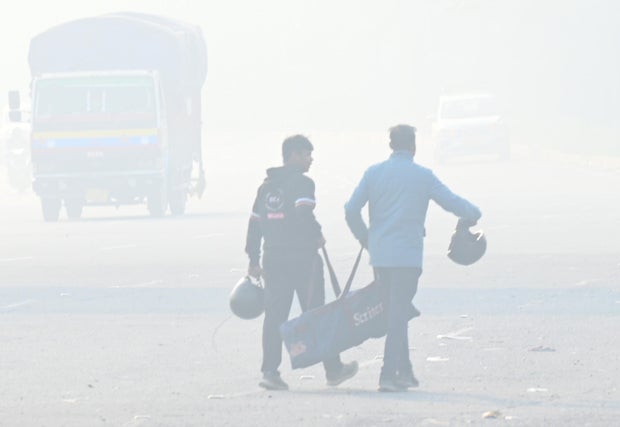New Delhi – Authorities in India’s capital have urged elementary schools to hold classes online, banned construction and urged people to work from home as the annual plague of air pollution hit the “severe” category in a health warning system for the first time this season. For the first time, the toxic air has drawn protests against the government, and a warning for people with health issues to simply leave Delhi if they can.
The severe designation indicates potentially serious health impacts for people with impaired immune systems, and negative affects even for healthy people, according to India’s Central Pollution Control Board (CPCB).
The emergency measures were announced after Delhi’s average Air Quality Index (AQI) sharply rose to 425. An AQI between 400 and 450 is categorized as “severe” and, as a norm, requires authorities to implement emergency measures under the government’s graded pollution response plan.
Air quality in India’s capital deteriorates sharply every year around this time due to a number of factors, including farm waste being burned off and seasonal climatic conditions – but activists say authorities have not done enough to contain the air pollution.
In a first, hundreds of people protested against the bad air quality at Delhi’s India Gate over the weekend.
Bilal Kuchay/NurPhoto/Getty
Several protesters wore gas masks as a symbolic act of protest and held up banners, including one that read: “I miss breathing.”
Earlier this month, one of the city’s top pulmonologists, Dr. Gopi Chand Khilnani, urged people with health problems who can afford to temporarily leave Delhi to do so.
“Everybody cannot afford to leave Delhi, because it is not simple, Khilnani told The Indian Express. “But those who have chronic lung disease or chronic heart disease, those who are on oxygen, and those who have the opportunity and ability to go abroad or to less polluted places, I very safely advise them to leave Delhi for 6-8 weeks from now, so as to protect themselves from the distress of breathlessness, the requirement of oxygen, and so on and so forth.”
The toxic air is affecting the health of people of the city regardless of underlying health problems, with many Delhi residents complaining of breathing problems and eye irritation this week.
Sunil Ghosh/Hindustan Times/Getty
“Every breath in Delhi NCR [National Capital Region] today comes with a major health cost — we’re seeing more patients struggling with breathlessness, asthma, and heart problems, especially among children, the elderly, and those with chronic diseases,” Dr. Harshal Ramesh Salve, at the Centre for Community Medicine at the prestigious All India Institute of Medical Sciences (AIIMS), told a group of journalists on Monday.
A recent report by the Lancet medical journal – Countdown on Health and Climate Change 2025 – carried a grim warning for India: The country recorded around 1.72 million deaths from outdoor air pollution in 2022, a staggering 38 percent rise since 2010.

